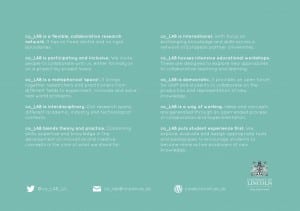“co_LAB is the Collaboration Laboratory Research Network at the University of Lincoln”
co_lab is a group that aims to bring people from different fields (within and without side of media) to collaborate in creating trans-media projects. It as created to explore new approaches to teaching and learning with a range of digital tools, in a collaboratively. This would hopefully include a share of knowledge, skills and teaching style across these fields.
Co_lab has been in projects from a number or fields. Both local to their research and students task as well as internationally. In researching ways to learn, they create projects that are both fun and informative.
Some Example;
Web We Want Festival, SouthBank Centre
Blind_Data – This interactive workshop challenges the public to take on the role of data analyst. Can you decide who represents a potential ‘national security’ risk based on their digital footprint alone? When our data is tracked by governments and corporations alike, what does our personal data and online identity reveal about us in different contexts?
Caught in the Web – Plunge into an immersive 3D history of the World Wide Web. See the developments that have changed the face of the digital world and learn about the restrictions that increasingly limit online experiences. This Oculus Rift ‘Virtual Reality’ game challenges public apathy towards mass surveillance of our digital lives. Using a virtual reality web browser Caught in the Web takes you on a journey through the central developments to issues of commerce, surveillance, censorship and participation over the past 25 years of the web, exploring those which have either restricted or opened up new avenues for accessibility.
www25
Media Culture 2020
Students formed mixed-nationality groups, with the use of social media and a range of pre-workshop tasks designed to foster collaborative partnerships. The groups were asked to imagine what digital media technology in the year 2020 might be like, with the aim to design and develop a concept for a technological innovation that might impact on or improve a shared European culture. The focus of the course content included interface design, ‘smart’ technologies, ‘open data’ and future developments in ICT, with groups having to explore these ideas, collaborating on mock-ups, workflow models, animations and concept designs. The initial concepts developed throughout the first workshop in Tampere were developed further during the second workshop in Liepaja.
IWEEK – LIEPĀJA UNIVERSITY
ran a workshop as part of Liepāja University’s 7th international New Media art festival ‘iWeek’ 2-7 November 2015 http://iweek.mplab.lv/en/.
IWEEK
The iWeek model provides a platform to explore new modes of international and interdisciplinary collaboration, co-creation and learning. Welcoming guests from University of Liepāja, Latvia and Hanze Academy of Pop Culture, Netherlands, we collaborated on a number of projects as part of the Frequency Fabratory.
Don’t Grow Up, it’s a Trap – This two day public workshop, ran by Johanneke Dijkstra (Hanze Academy of Popular Culture) and a team of Dutch students, aimed to explore the freedom of creativity and imagination we experience during childhood. The workshop invited children to direct the team of students to build an art installation in response to their drawings, designs and stories. The creations dreamt up by participants included a Big Ben Time Machine, Ariana Grande taking her pet alien cat for a walk, a rocket ship and a gigantic cardboard archway.
Bank of Kindness – As part of the ‘Connected Neighbourhoods’ project, students from LSFM, University of Liepaja and Hanze Academy of Popular Culture ran a two day public workshop as part of the Frequency Fabratory’. The workshop, called ‘The Bank of Kindness’, invited people to spread a little happiness by choosing a random act of kindness to perform, in exchange for contributing another kind act for someone else to perform. Participants were encouraged to post pictures of their good deeds on social media via #BankofKindness.


Recent Comments